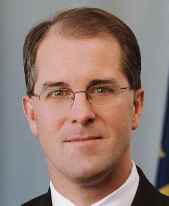By Diane Silver
Last week I got angry, really, REALLY angry when Congress passed the Military Commissions Act, dumping habeas corpus, condoning torture and generally mucking up the U.S. Constitution.
I wrote a post entitled:
"Am I alone? Today I feel like a woman without a country," and I received some interesting comments in reply. These included a few that noted that us darn liberals were never going to win an election if we keep -- as thse folks said -- dumping on our country. What ensued was a fairly mannerly discussion about what it means to be a patriot. I want to bring the discussion to the front of the blog and answer in more detail here.
For the record, here are some of the comments.
(The full comments are available here.)
In part, Snoop wrote:
As long as you liberals continue to voice their contempt for this country, you will lose elections.
El borak, in part, wrote a bit later (emphasis added):
Now I realize perfectly well that liberals are here at a disadvantage, that loving America seems inextricably entwined with wanting to see it kick everyone else's ass. We live in an age of nationalism, and most voters are interested in national greatness. If they want to win elections, liberals have to harness that desire while perhaps diverting it to something a little more constructive than the conservatives have. But they have to recognize that it is and that it drives politics.
If that seems unfair to liberals I can only offer a choice: you can strike at the voters through contemptuous emotional symbolism and continue to lose or you can play the game by the rules and accept the gift of a speaker's gavel that the GOP is offering through its incompetence and myopia.
Many thanks to Snoop and el borak for helping me clarify my thinking, and I actually mean that sincerely.
I would suspect -- or at least hope -- that snoop, el borak, the members of Congress who voted for this hideous act share one characteristic with me, I would hope that we all love this nation, and that we want to do what's best for it. The issue then becomes how can we be a great nation and still protect ourselves?
Personally, I think national greatness is about much more than the ability to "kick everyone else's ass."
National greatness is about the freedom and ideals that led the Widow Silver and her sons to undergo a difficult voyage to this country just 60 years after the Mayflower. (A relative researched this remarkable woman.)
National greatness is about the freedom and ideals that made my great grandmother and great grandfather come here from Austria in the early 1900s.
Above all, national greatness is not about kicking anyone's ass or having the biggest stick or the biggest military in the world.
A nationalism that focuses on kicking ass reminds me of junior high. That's when -- as 13-year-olds and 14-year-olds -- we lived and died on the fortunes of our football team. Don't get me wrong. I love cheering a team on. I live near Kansas City and took absolute, cheerful and loud delight in seeing the Kansas City Chiefs smash the San Francisco 49ers 41 to zip on Sunday.
But that was a game. In a game, it's OK to root for one side to "kick everyone else's ass." In life, and most decidedly in foreign policy, that is a childish idea that leads to the kinds of messes we have in Iraq. That kind of immaturity also leads to the mess that's been made of fighting terrorists.
To protect ourselves in a dangerous world, we need mature analysis of the situation and reasoned use of the military and diplomacy. (And no, I don't want to debate Iraq or the best response to terrorism right now. That's a discussion for another day. This post is already long enough.)
Here's the money quote: I'm not going to debate you about elections. That's turning what should be a serious discussion into a me-win/you-lose game once again. I have something much more important to discuss, and that's the fate of my nation.
A true patriot is a person who believes not only in her country, but in the ideals that created it.
Losing an election isn't half as worrisome as seeing the United States and its government lose its way. When that happens, it is the duty of every patriot to stand up and speak the truth -- no matter how unpleasant that truth may be.
I say that as someone who has served as a press secretary in a statewide campaign (Democratic candidate for governor in Kansas in the 1990s). I also ran communications for a statewide issues campaign. I know about politics. I know the way you're supposed to talk, and frankly, such talk just hurts this nation.
True national greatness is what the United States has touched on and off throughout its history. The way we have lived and welcomed others and struggled with our problems has made us the envy of the world. The way we have treated people with dignity and have respected their rights is what makes America great. The free air of this nation is what's great -- not destroying civil rights, not condoning any form of torture, and certainly not ignoring the Constitution that created us.
True national greatness is hard.
It takes maturity and the willingness to see what's really happening in the world. It takes a willingness to hear the truth.
In the dangerous world we live in today, we will not survive unless we can throw off our childish impulses. America has to grow up, and that means each of us has to be willing to see patriotism as more than rooting for the home team.
















